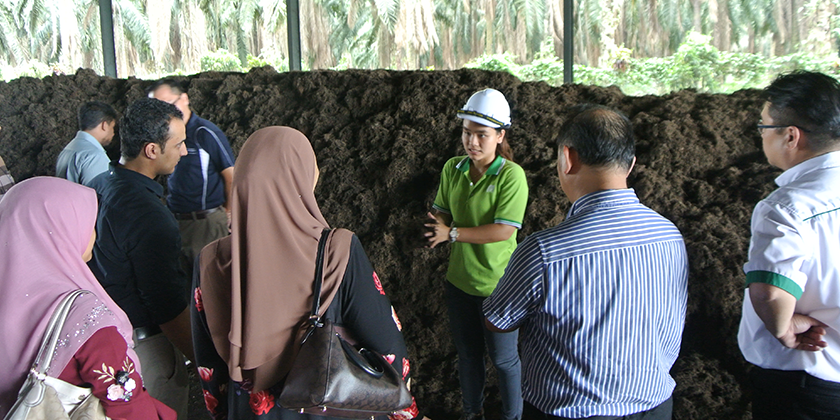
May 16, 2018, by Communications
Transforming Sustainable Oil Palm Research into Reality
A group of researchers from Centre of Sustainable Palm Oil Research (CESPOR), University of Nottingham Malaysia together with industrial partners have successfully built a working Integrated Anaerobic Aerobic Bioreactor (IAAB) system to transform palm oil mill effluent (POME) into biogas and clean water. The system is built at an existing commercial palm oil mill treating 10 m3/h of POME.
Prof Chong Mei Fong, Dr Chan Yi Jing and Prof Denny Ng have started the project since 2015 based on the research outcomes of past 10 years. By working together with Havys Oil Mill Sdn Bhd, the pre-commercialized scale IAAB is successfully commissioned in April 2018. On 9 April 2018, more than 40 industrial practitioners and academicians have joined CESPOR Open Day and witnessed the full operating unit of IAAB system on site.
The project was funded by Havys Oil Mill Sdn Bhd. which worth more than RM 2 million to construct the system. The system is currently located at CESPOR research facility, Palong, Pahang.
“After all the hard work in the past two years, we are glad to transform the research into a commercial system which can convert all POME from palm oil mill into bioenergy and clean water.” Prof Denny Ng said.
“Transforming our technology from research to commercialized plant for the industry shows that bridging the gap between research and industry is possible,” Prof Chong Mei Fong said.
“I am very glad to see that my lab scale IAAB in my PhD study can be developed into pre-commercialized scale. I hope IAAB technology can keep on growing and will be widely adopted by the palm oil millers.” Dr Chan Yi Jing said.
Meanwhile, during the CESPOR Open Day, guests made a tour to a bio-fertilizer production plant co-located near the oil palm mill. Bio-fertilizers are sustainable products from the recycling of biomass (mainly empty fruit bunches) in combination with other waste materials from the processing of palm oil. Research works further improve the quality of the living organic bio-fertilizer through the integration of beneficial soil microorganisms to control Ganoderma spp. basal stem rot (BSR) disease of oil palm. BSR is prevalent in estates across Malaysia and Indonesia. Dr Christina Supramaniam and her team are working closely with Dr Carmen Goh from Green Plant Organic Fertilizer through an industrial research grant worth RM 580,000 for three years, 2016-2019. The purpose of the grant is to prepare specific bio-formulation to assimilate indigenous bacteria and fungi into the processing of bio-fertilizer. In previous studies, Dr Supramaniam has selected natural antagonistic microbial species from Malaysian soil, to control the growth and proliferation of Ganoderma fungi. This study aimed to show the efficacy of a sustainable green product to control BSR disease in mature oil palm in both inland and peat soil.
“Although physical and chemical treatments have been reliable to control BSR, biological solutions offer both a long-term prevention of the disease and ability to rehabilitate the environment for the sustainable management of estates,” Dr Christina explained.
For more information, please contact Denny Ng
-
Post a comment



